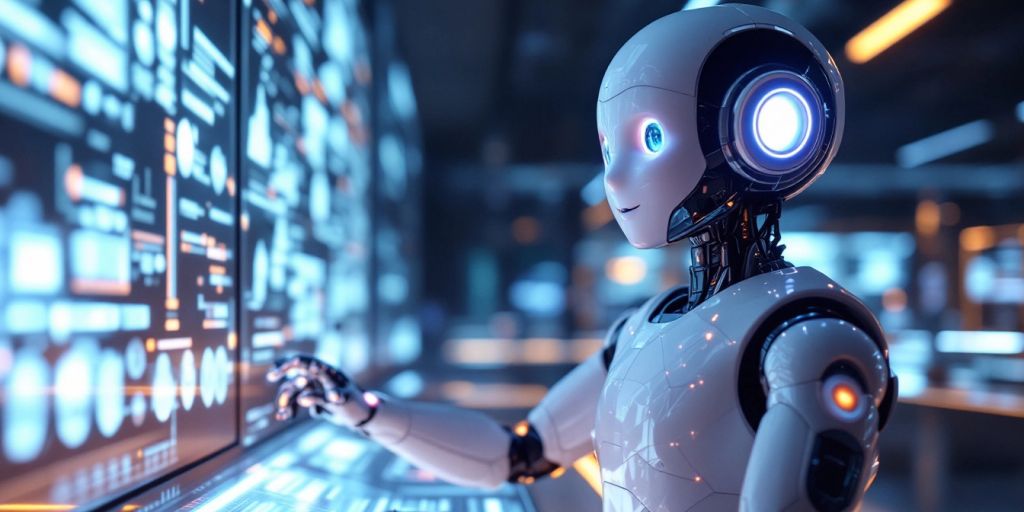
OpenAI is changing the game in technology with its advanced artificial intelligence. This organization is not only creating powerful tools but also making them accessible to everyone. In this article, we will explore what OpenAI is, how it affects software development, its role in different industries, and the future it promises.
Key Takeaways
- OpenAI is a leader in artificial intelligence, making advanced technology available to everyone.
- It enhances software development by speeding up coding and improving creativity.
- OpenAI is transforming industries like healthcare and education with innovative solutions.
- The organization focuses on making AI accessible for small businesses and developers.
- Ethical challenges and privacy concerns are important topics as AI continues to evolve.
Understanding Open AI: What Is It?
Defining Open AI
Open AI is a leading organization in the field of artificial intelligence (AI). It focuses on creating advanced AI technologies that can learn and adapt. This helps machines understand and respond to human language more effectively.
The Mission and Vision of Open AI
Open AI aims to ensure that artificial intelligence benefits all of humanity. Its vision includes:
- Promoting safe and responsible AI use.
- Encouraging collaboration among researchers and developers.
- Making AI accessible to everyone, not just large companies.
Key Technologies Behind Open AI
Open AI uses several key technologies to achieve its goals:
- Natural Language Processing (NLP): This allows machines to understand and generate human language.
- Machine Learning: This helps AI systems learn from data and improve over time.
- Reinforcement Learning: This teaches AI to make decisions by rewarding it for good choices.
Open AI is not just about technology; it’s about creating a future where AI helps people in their daily lives.
The Impact of Open AI on Software Development
Advancements in Natural Language Processing
Open AI has made significant strides in Natural Language Processing (NLP). These advancements allow machines to understand and generate human-like text. For instance, models like GPT-3 enable applications such as chatbots and virtual assistants, improving user interactions and automating tasks.
Accelerating Software Development
Open AI’s tools can speed up software development in various ways:
- Code Completion: AI can suggest code snippets, making it easier for developers to write.
- Documentation Generation: It can automatically create documentation, saving time.
- Automating Repetitive Tasks: This increases productivity and reduces the time needed to launch software.
Enhancing Creativity and Design
Open AI also boosts creativity in design. With tools like DALL-E, designers can create unique artwork from text prompts. This technology inspires new ideas and helps in generating visual content for projects.
Open AI is changing how we think about software development, making it faster and more creative. As developers use these tools, they can focus on innovative solutions rather than mundane tasks.
Open AI’s Role in Revolutionizing Various Industries

Transforming Healthcare and Biotechnology
Open AI is making a big difference in healthcare. AI helps doctors and researchers analyze complex data quickly. This can lead to new treatments and better patient care. For example, AI can:
- Identify patterns in medical data.
- Assist in drug discovery.
- Improve disease diagnosis.
Innovations in Finance and Accounting
In finance, Open AI is changing how businesses operate. AI tools can automate tasks like data entry and analysis, which saves time and reduces errors. Some benefits include:
- Faster processing of financial transactions.
- Enhanced fraud detection.
- Improved customer service through chatbots.
Revolutionizing the EdTech Industry
Open AI is also impacting education technology. It helps personalize learning experiences for students. For instance, AI can:
- Automate grading and assessments.
- Provide instant feedback to students.
- Help teachers manage their workload more efficiently.
Open AI is not just about technology; it’s about making life easier and more efficient for everyone.
Overall, Open AI is revolutionizing various industries by introducing innovative solutions that enhance productivity and creativity. Its influence is felt across healthcare, finance, and education, paving the way for a smarter future.
Democratizing AI: Open AI’s Approach
APIs for Developers and Businesses
OpenAI is making artificial intelligence accessible to everyone. By providing APIs, developers can easily integrate AI into their applications. This means that even small companies can use advanced AI without needing a big budget. Here are some key points about OpenAI’s APIs:
- Easy to use for developers.
- Cost-effective for small businesses.
- Allows for quick integration into existing systems.
Empowering Small Businesses
OpenAI’s tools help small businesses compete with larger companies. They can use AI to improve their services and reach more customers. Some benefits include:
- Automating customer support with chatbots.
- Analyzing data to understand customer needs better.
- Creating personalized marketing strategies.
Accessibility and Inclusivity in AI
OpenAI believes that everyone should benefit from AI technology. They focus on making their tools user-friendly for all. This includes:
- Providing clear documentation and support.
- Ensuring that AI tools are available in multiple languages.
- Working to eliminate biases in AI models.
OpenAI’s mission is to ensure that artificial intelligence benefits all of humanity, not just a select few. By democratizing access to AI, they are paving the way for a more inclusive future.
Challenges and Ethical Considerations of Open AI
Addressing Privacy Concerns
Open AI technologies can collect and analyze vast amounts of data. This raises important questions about user privacy. Organizations must ensure that they handle data responsibly and protect user information from unauthorized access.
Ensuring Fairness and Transparency
AI systems can sometimes show bias based on the data they are trained on. To combat this, developers need to:
- Regularly audit AI models for bias.
- Use diverse datasets for training.
- Be transparent about how AI decisions are made.
Overcoming Resistance to AI Adoption
Many people are hesitant to embrace AI due to fear of job loss or misunderstanding of the technology. To help ease these concerns, it’s important to:
- Provide education and training on AI tools.
- Highlight the benefits of AI in enhancing productivity.
- Foster open discussions about AI’s role in society.
The successful integration of Open AI into various sectors depends on addressing these challenges and ensuring ethical practices.
Future Prospects of Open AI

Potential Breakthroughs on the Horizon
The future of Open AI looks promising, with exciting advancements expected in various fields. Some potential breakthroughs include:
- Enhanced AI models that can understand context better.
- More efficient algorithms that require less data to learn.
- AI systems that can collaborate with humans in creative tasks.
The Evolution Beyond ChatGPT
Open AI is not stopping with ChatGPT. Future developments may include:
- More interactive AI that can hold conversations with deeper understanding.
- AI that can generate multimedia content, like videos and music.
- Tools that help users create personalized experiences in real-time.
Long-term Implications for Society
As Open AI continues to grow, it will have significant effects on society. Some implications include:
- Job transformation in various sectors as AI takes over repetitive tasks.
- Increased accessibility to technology for everyone, including small businesses.
- Ethical discussions around AI use and its impact on privacy and security.
Open AI is paving the way for a future where technology and creativity merge, leading to unprecedented opportunities for innovation and growth.
Conclusion
In summary, OpenAI is changing the way we think about technology. Its tools, like ChatGPT, are not just smart; they help people and businesses work better and faster. By making AI easier to use, OpenAI is opening doors for everyone, from students to big companies. As we look to the future, it’s clear that OpenAI will keep pushing the limits of what technology can do, making our lives easier and more connected. The journey of AI is just beginning, and with OpenAI leading the way, the possibilities are endless.
Frequently Asked Questions
What is Open AI?
Open AI is a research organization that focuses on artificial intelligence (AI). It creates advanced AI technologies to help make tasks easier and more efficient.
How does Open AI impact software development?
Open AI improves software development by speeding up coding, helping create better designs, and making it easier for developers to work.
What industries benefit from Open AI?
Many industries benefit from Open AI, including healthcare, finance, and education. It helps improve services and create new solutions.
How does Open AI make AI accessible?
Open AI provides tools like APIs that allow developers and businesses to use its AI technologies without needing to build their own.
What are some challenges of using Open AI?
Some challenges include privacy concerns, ensuring fairness in AI decisions, and getting people to accept and use AI technologies.
What does the future hold for Open AI?
The future of Open AI looks bright with potential new technologies and applications that could change how we live and work.


